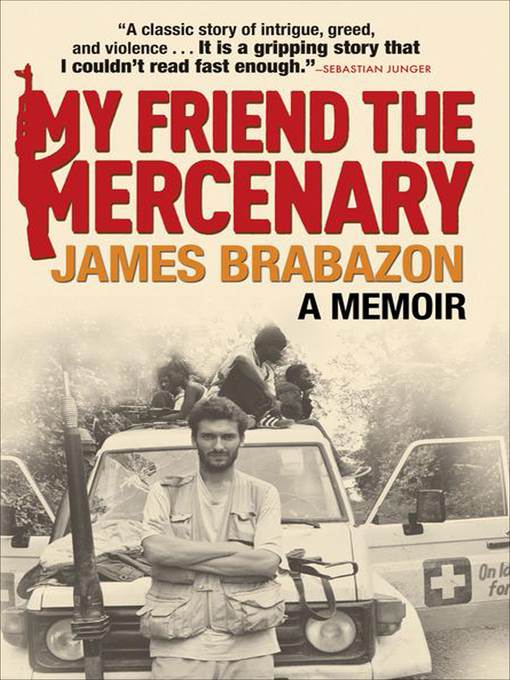
My Friend the Mercenary
A Memoir
کتاب های مرتبط
- اطلاعات
- نقد و بررسی
- دیدگاه کاربران
نقد و بررسی

November 8, 2010
The fog of war, informational and moral, permeates this adrenalized memoir of Africa's dirty wars and the men who fight them. British documentarian Brabazon entered Liberia in 2002 to film rebel forces in that country's civil war, taking along bodyguard Nick du Toit, a mercenary and former soldier in South Africa's apartheid-era army. Worlds apart politically, the two men bond amid the savage conflict—in one excruciating scene, Brabazon films rebels cannibalizing a prisoner—as the author comes to depend on and admire his tough, courageous companion. Nick joins a byzantine conspiracy to overthrow the government of oil-rich Equatorial Guinea and invites Brabazon to film the prospective coup, a proposal that crosses the boundaries of journalistic ethics, though it strongly appeals to Brabazon's lust for adventure and cash. His postmortem on the plot's disastrous outcome, with its cast of shadowy financiers, rival intelligence agencies, and soldiers of fortune, reads like a political thriller. Brabazon's searing narrative captures both the allure of war—the rush of danger, the deep camaraderie, the get-rich-quick mirages—and its brutal realities. It's both a seductive paean to and a harsh exposé of the mercenary ethos that fattens off of Africa's travails.

Starred review from November 1, 2010
Intensely vivid story of war and the peculiar breed of warriors who fight it in 21st-century Africa.
An award-winning filmmaker and frontline war reporter, Brabazon cut his teeth in the Liberian rainforest, marching hundreds of miles with the rebels of Liberians United for Reconciliation and Democracy, who were seeking to overthrow the despotic Charles Taylor in February 2002. Before the author's reports for the BBC radio, the existence of LURD was just a rumor. But for the company of a seasoned South African military man and adventurer named Nick du Toit, it might have been up to another intrepid journalist to get the scoop. The green Brabazon might not have survived even the dysentery that laid him low a few days into the journey, let alone gunfire or worse during bloody skirmishes with Taylor's troops, if not for du Toit's experienced hand nearby. Their bond survived the horrors of Liberia's civil war on that trip and others, despite the author's suspicions (and friends' warnings) about du Toit's history with the apartheid-era Special Forces and his new careers as arms dealer and soldier of fortune. The man the author knew seemed gentle and humane, as well as fearless. Brabazon's respect for du Toit led him to seriously consider his invitation to film a coup he and "business partners" were plotting against another despot, Teodoro Obiango of Equatorial Guinea. Ironically, a family tragedy saved the author from his friend's fate: capture by Obiango and horrific torture at the hands of his security forces in the notorious Black Beach prison, where Obiango had begun his career in brutality. The book opens with stomach-churning accounts of the torture that du Toit and his co-conspirators suffered, based partly on videos the torturers made. Brabazon himself was unflinching as a documentarian of war, and his prose is no less sparing, whether describing the gruesome reality of guerrilla combat or the agonizing moral quandaries of battle. The first two-thirds of the book offer as thrilling a narrative as any war novel on the shelves, and the finale is as clear a picture of the murky world of postcolonial Africa as the readers are likely to get.
A haunting memoir and tribute to an extraordinary comrade-at-arms.
(COPYRIGHT (2010) KIRKUS REVIEWS/NIELSEN BUSINESS MEDIA, INC. ALL RIGHTS RESERVED.)

December 1, 2010
Brabazon, a British journalist and documentary filmmaker, here details his two-year (2002-04) relationship with Nick du Toit, an arms dealer, mercenary, and onetime member of South Africa's apartheid Special Forces. This memoir draws its power from du Toit's role as Brabazon's "bodyguard" while the author was shooting footage of the insurgency against Liberian dictator Charles Taylor. Readers here encounter an array of elements common to these wars: blood diamonds, child soldiers, and cannibalism. Less familiar is the moral ambiguity of unorthodox violence against an indicted war criminal and Brabazon's ethical compromise in his trek with the Liberian rebels. The insurgency emerges in this book from the larger context Brabazon establishes regarding neighboring states. Only a family emergency prevents him from accompanying du Toit during an abortive coup d'etat in oil-rich Equatorial Guinea. VERDICT Because of the subject and the author's lucid writing, the book is both a gripping adventure and a valuable account of a West African tragedy. It will especially interest students of African politics and journalism. [See Prepub Alert, LJ 9/15/10.]--Zachary T. Irwin, Pennsylvania State Univ.-Erie
Copyright 2010 Library Journal, LLC Used with permission.

February 1, 2011
The post-imperial history of West Africa has seen a series of horrific civil wars, from Nigeria to Sierra Leone to Liberia. Photojournalist and documentary filmmaker Brabazon was determined to cover the carnage in Liberia as rebels fought against the regime of Charles Taylor. Well aware of the dangers he would face, he hooked up with a bodyguard, Nick du Toit. He was a former officer in the South African army under the apartheid government. Like many others in similar circumstances, du Toit drifted into a career as a mercenary. Brabazons narrative proceeds on two tracks. It is a chronicle of a particularly savage military conflict, in which torture and even cannibalism come to be regarded as routine. It is also a story of his unlikely but deepening friendship with du Toit, and that evolving friendship also provides a sometimes surprising window into the motivations and characteristics of mercenaries. This is a disturbing, even sickening, but revealing account of just a few of the sufferings endured by Africans in recent years.(Reprinted with permission of Booklist, copyright 2011, American Library Association.)

























دیدگاه کاربران